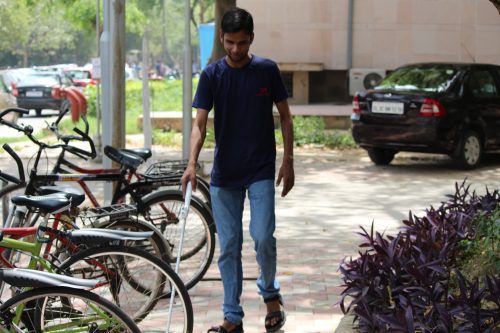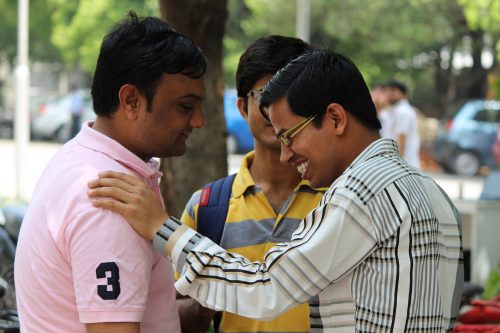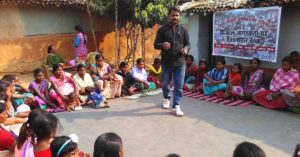TBI Blogs: 4 Ways Media Can Become More Disabled-Friendly and Help Change Society’s Perceptions
Whatever we see in the media is a reflection of our society’s perceptions. Inclusive content will ensure that inclusion becomes a reality for people with any impairment or disability.

Whatever we see in the media is a reflection of our society’s perceptions. Inclusive content will ensure that inclusion becomes a reality for people with any impairment or disability.
Often we hear journalists raise a question on behalf of persons with disabilities, “Is the government doing enough for the country’s disabled population?” Reporters and anchors accuse the government representatives for not doing enough to make the environment ‘inclusive,’ but what if we were to turn this question around and ask our friends in the media, “What role does the media play towards inclusion of persons with disabilities? Does the media practice what it preaches?”
In today’s day and age, media is a powerful medium which can be used to bring about transformation of any kind. If media became more sensitive towards the needs of the disabled, it will automatically get reflected in the society at large, because of the impact media has on a large section of the population.
Here are four things the media can do right now to become more inclusive towards persons with disabilities.
1. Stop viewing the disabled population as objects of pity

There is a need to be sensitive towards people with blindness and visual impairment but the last thing they expect is pity. Media needs to view them as equal citizens of the country and potential resources for the country’s development. By portraying them as objects of pity, the media excludes them out of the mainstream and makes them topics of discussion as a separate section of society.
The media needs to be aware of the correct terms to be used for people with disabilities. For instance, terms like crippled and handicap are unacceptable and politically incorrect. However, terms like disabled, visually impaired or people with low vision are correct usage.
The media also needs to stop portraying persons with disabilities as victims, at all times. Some networks, like the Australian Broadcasting Corporation have strict guidelines in place for their producers when it comes to dealing with disability; producers are instructed to ask themselves if the programme is coming across as patronizing, victimizing, demonizing or normalizing.
2. Make programming accessible to people with blindness and visual impairment
How many TV stations have accessible programming for people who are blind or visually impaired? How many content producers are even sensitive to the need for accessible programming?
There is a lot of programming on national television channels that is inaccessible to the blind and visually impaired people. For instance, some programming consists of graphic elements that are not translated into audio or voice narrations. This hampers the TV watching experience of a person with blindness or any other visual impairment. Content producers need to be aware of this need when they put together a programme.
A lot of programmes have a ‘VOTE’ or a ‘QUIZ’ question in the end. The anchor normally announces that a question is coming up on the screen but the question is not read out loud. As a result, a disabled person cannot participate in that activity. If the media is conscious of the needs of people with visual disability, their content would become inclusive and accessible to a larger section of the population.
3. Include persons with disabilities in mainstream media discussions.

Often, disabled people are invited to discussions or debates on TV and radio only around topics of disability. When was the last time we heard a disabled person speak from a media platform on common topics of interest, like, sports, politics, cinema or climate change?
This again is an exercise of exclusion. The disabled person is as much a part of the country as any able bodied person. They have a right to express their opinion on matters of national interest and importance. Anchors and reporters should engage with persons with disabilities on a wide array of topics rather than limiting it to their respective disability.
Inviting them on discussions on day to day political developments, or on performances in the Olympics, or even a discussion on the latest tax reforms, will encourage inclusion of persons with disabilities into the mainstream. This will then get reflected in the society at large, where too we will see discussion forums open up to persons with disability.
4. Stop portraying them as super heroes
Media portrayal oscillates between two extremes: pathetic and superhuman. Persons with disabilities are just as commonplace as other regular citizens of the country. There are existing stereotypes that mirror the prejudice which exist in society, through which media portrays persons with disability.
Often media tends to view disabled persons only in the light of their disabilities. The focus is on the impairment and not on the individual. This is reflected pictorially as well. The camera focuses on the disabled part of the person rather than the person as a whole.
There are talent shows on Television which provide a platform to people to showcase their talents. If a visually impaired person participates, the media pushes their cause based on their impairment rather than their actual talent. The media should avoid this practice.
The British Broadcasting Corporation has guidelines for portrayal of disability on air, instructing producers not to perpetuate any content that may reflect prejudice and disadvantage existing in societies. The BBC also asks to avoid any careless assumptions pertaining to references to disability.
Whatever we see in the media is a reflection of our society’s perceptions. If the above are kept in mind while creating content for a mass audience, inclusion will become more of a reality for people with any impairment or disability. Media is a powerful tool with influence on a large section of people across gender, race, age and ethnicity. Let’s use it to make persons with disability an integral part of the society and community at large.
By George Abraham, CEO, Score Foundation in New Delhi. Score’s flagship project is EYEWAY which operates a national toll free helpline for the blind and visually impaired.
People who need help in living life with blindness can call us on our toll free number 1800 300 20469. People who would like to donate or volunteer with us, can write to us at [email protected]
Like this story? Or have something to share? Write to us: [email protected], or connect with us on Facebook and Twitter (@thebetterindia).
If you found our stories insightful, informative, or even just enjoyable, we invite you to consider making a voluntary payment to support the work we do at The Better India. Your contribution helps us continue producing quality content that educates, inspires, and drives positive change.
Choose one of the payment options below for your contribution-
By paying for the stories you value, you directly contribute to sustaining our efforts focused on making a difference in the world. Together, let's ensure that impactful stories continue to be told and shared, enriching lives and communities alike.
Thank you for your support. Here are some frequently asked questions you might find helpful to know why you are contributing?


This story made me
-
97
-
121
-
89
-
167














